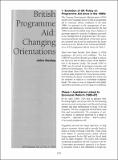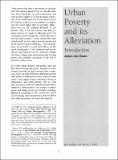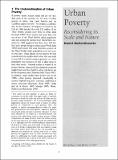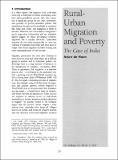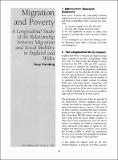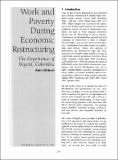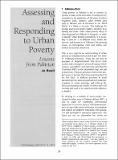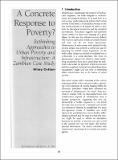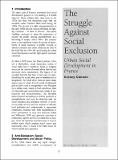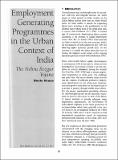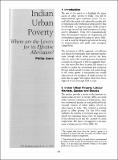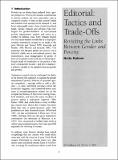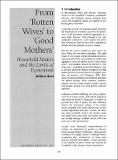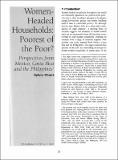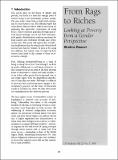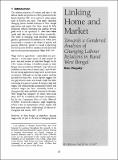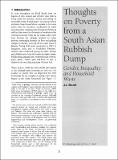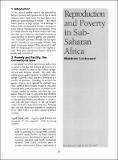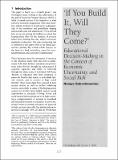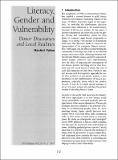Volumes 21 - 30: Getting Institutions Right for Women in Development: Recent submissions
Now showing items 321-340 of 444
-
British Programme Aid: Changing Orientations
(Institute of Development Studies, 01/10/1996)Summaries The British have linked the provision of programme aid to World Bank and IMF economic policy reform conditions since the early 1980s. Since then they have liberalized their procedures in tune with local ... -
Urban Poverty and its Alleviation:
(Institute of Development Studies, 01/04/1997) -
Urban Poverty:
(Institute of Development Studies, 01/04/1997)Summaries The article describes how and why the scale of urban poverty in much of Africa, Asia and Latin America seems to have been underestimated, its nature misunderstood (or for political reasons, misrepresented) and ... -
Rural?Urban Migration and Poverty:
(Institute of Development Studies, 01/04/1997)Summaries What is the relationship between rural?urban migration and poverty? This article takes up this question, which is by no means new, but about which there is no consensus. The importance of migration for urban as ... -
Migration and Poverty:
(Institute of Development Studies, 01/04/1997)Summaries The UK Longitudinal Study is used to answer a number of key questions about the relationships between migration and poverty in Britain. In general, the poor migrate less than the rich, many of those who migrate ... -
Work and Poverty During Economic Restructuring:
(Institute of Development Studies, 01/04/1997)Summaries Colombia escaped the worst of the debt crisis and has voluntarily adopted the kind of economic restructuring advocated by the World Bank and the IMF. Its experience represents a partial test of the effects of ... -
Assessing and Responding to Urban Poverty:
(Institute of Development Studies, 01/04/1997)Summaries Pakistan provides an interesting challenge to poverty analysts and policy makers concerned with urban poverty because urban poverty is neither as extensive nor as visible as in rural areas of the country, or as ... -
A Concrete Response to Poverty?:
(Institute of Development Studies, 01/04/1997)Summaries This article looks at definitions and concepts of urban poverty and the ways in which they inform the infrastructure debate. Parallels between the treatment of poverty in classical literature and the treatment ... -
The Struggle Against Social Exclusion:
(Institute of Development Studies, 01/04/1997)Summaries This article looks at the extensive French policies concerned with preventing social exclusion, and it considers what this means on the ground using the example of a particular region in north western France. ... -
Employment Generating Programmes in the Urban Context of India:
(Institute of Development Studies, 01/04/1997)Summaries Unemployment and underemployment, in association with low and irregular incomes, are major causes of urban poverty in India. The increasing importance of urban poverty, together with unfavourable labour market ... -
Indian Urban Poverty:
(Institute of Development Studies, 01/04/1997)Summaries This article reviews the literature on the causes of urban poverty in India, and explores possible policy responses. According to the author, urban poverty programmes have failed to address the most important ... -
Editorial: Tactics and Trade?Offs:
(Institute of Development Studies, 01/07/1997)Summaries The contributions in this Bulletin challenge the growing tendency of development agencies to conflate gender issues with poverty concerns. The selective terms on which this has been done has allowed issues of ... -
From ‘Rotten Wives’ to ‘Good Mothers’:
(Institute of Development Studies, 01/07/1997)Summaries This article encompasses a critical review of new collective models of the household, together with a discussion of gender power and its key implications. These include understanding ‘the household’ as a political ... -
Women-Headed Households: Poorest of the Poor?
(Institute of Development Studies, 01/07/1997)Women-headed households are commonly regarded as the ‘poorest of the poor’. Not only do they seem to be disproportionately concentrated among low-income groups, but female headship itself is seen to exacerbate poverty. Yet ... -
From Rags to Riches:
(Institute of Development Studies, 01/07/1997)Summaries This article examines the contradictory implications of rising rural incomes – generated through export crop production – for women in a rural community of south?eastern Iran. It uses two different, but related, ... -
Linking Home and Market:
(Institute of Development Studies, 01/07/1997)Summaries This article identifies changing labour market relations in West Bengal agriculture and argues that these cannot be fully explained without extending the analysis beyond paid work to the questions of who does ... -
Thoughts on Poverty from a South Asian Rubbish Dump:
(Institute of Development Studies, 01/07/1997)Summaries The author reflects on the interlocking circuits of accumulation and consumption that characterise the management of household solid waste or garbage in two South Asian cities. She examines the multiple axes ... -
Reproduction and Poverty in Sub?Saharan Africa
(Institute of Development Studies, 01/07/1997)Summaries Ideas about poverty and gender in Africa have been built in part on a conventional model of poverty and fertility, which implies that specific policy interventions such as female education will have synegistic ... -
‘If You Build It, Will They Come?’:
(Institute of Development Studies, 01/07/1997)Summaries Primary schooling is considered in policy circles to be an effective means to enhance the income and welfare of poor households, with particularly high returns for girls. Education achievement in India has, ... -
Literacy, Gender and Vulnerability:
(Institute of Development Studies, 01/07/1997)Summaries This article explores the complex relationship between ‘illiteracy’ and women's vulnerabilities. Based on ethnographic field work in southern Ghana during the pilot phase of a national functional literacy ...

